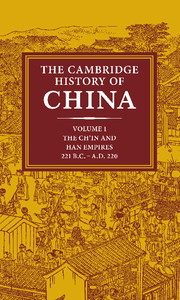Book contents
- Frontmatter
- Introduction
- 1 The state and empire of Ch'in
- 2 The Former Han dynasty
- 3 Wang Mang, the restoration of the Han dynasty, and Later Han
- 4 The conduct of government and the issues at stake A.D. 57–167
- 5 The fall of Han
- 6 Han foreign relations
- 7 The structure and practice of government
- 8 The institutions of Later Han
- 9 Ch'in and Han law
- 10 The economic and social history of Former Han
- 11 The economic and social history of Later Han
- 12 The religious and intellectual background
- 13 The concept of sovereignty
- 14 The development of the Confucian schools
- 15 Confucian, Legalist, and Taoist thought in Later Han
- 16 Philosophy and religion from Han to Sui
- Bibliography
- Glossary-Index
- Map 7 The Han empire, 143 b.c.
- Map 8 The Han empire, 108 b.c
- Map 9 The Han empire, a.d. 2
- Map 12 The Han empire, a.d. 140">
- References
8 - The institutions of Later Han
Published online by Cambridge University Press: 28 March 2008
- Frontmatter
- Introduction
- 1 The state and empire of Ch'in
- 2 The Former Han dynasty
- 3 Wang Mang, the restoration of the Han dynasty, and Later Han
- 4 The conduct of government and the issues at stake A.D. 57–167
- 5 The fall of Han
- 6 Han foreign relations
- 7 The structure and practice of government
- 8 The institutions of Later Han
- 9 Ch'in and Han law
- 10 The economic and social history of Former Han
- 11 The economic and social history of Later Han
- 12 The religious and intellectual background
- 13 The concept of sovereignty
- 14 The development of the Confucian schools
- 15 Confucian, Legalist, and Taoist thought in Later Han
- 16 Philosophy and religion from Han to Sui
- Bibliography
- Glossary-Index
- Map 7 The Han empire, 143 b.c.
- Map 8 The Han empire, 108 b.c
- Map 9 The Han empire, a.d. 2
- Map 12 The Han empire, a.d. 140">
- References
Summary
The most important source for the study of Later Han institutions is the “Treatise on the hundred officials” (more freely, “Treatise on bureaucracy”) in the Hou-Han shu or Later Han history. This text is systematic, detailed, and much superior to its counterpart in the Han shu. Additional information is found in surviving fragments of once comprehensive accounts on bureaucracy by Han authors. The institutions of Later Han are therefore more fully known than those of Former Han, even though there can be no doubt that the basic pattern was the same.
As in Former Han times, the status of officials was defined by a scale beginning with those entitled to stipends equivalent to 10,000 bushels (shih) of grain at the top, and ending with assistant clerks (tso-shih) at the bottom. From 23 B.C. onward, the number of ranks was eighteen. The grand tutor (t'ai-fu) was above the scale. Stipends were fixed in relation to this theoretical ranking, but were not in direct proportion to it.
THE CENTRAL GOVERNMENT
The grand tutor
During Former Han, the office of the grand tutor (t'ai-fu) had been filled only at the beginning and end of the dynasty. The Later Han used a different approach and appointed twelve grand tutors throughout the entire period. An aged and respected man was normally selected for the position shortly after the enthronement of an emperor, but the grand tutors usually died after a few years, and the office was then left vacant for the remainder of the reign.
- Type
- Chapter
- Information
- The Cambridge History of China , pp. 491 - 519Publisher: Cambridge University PressPrint publication year: 1986
References
- 1
- Cited by

